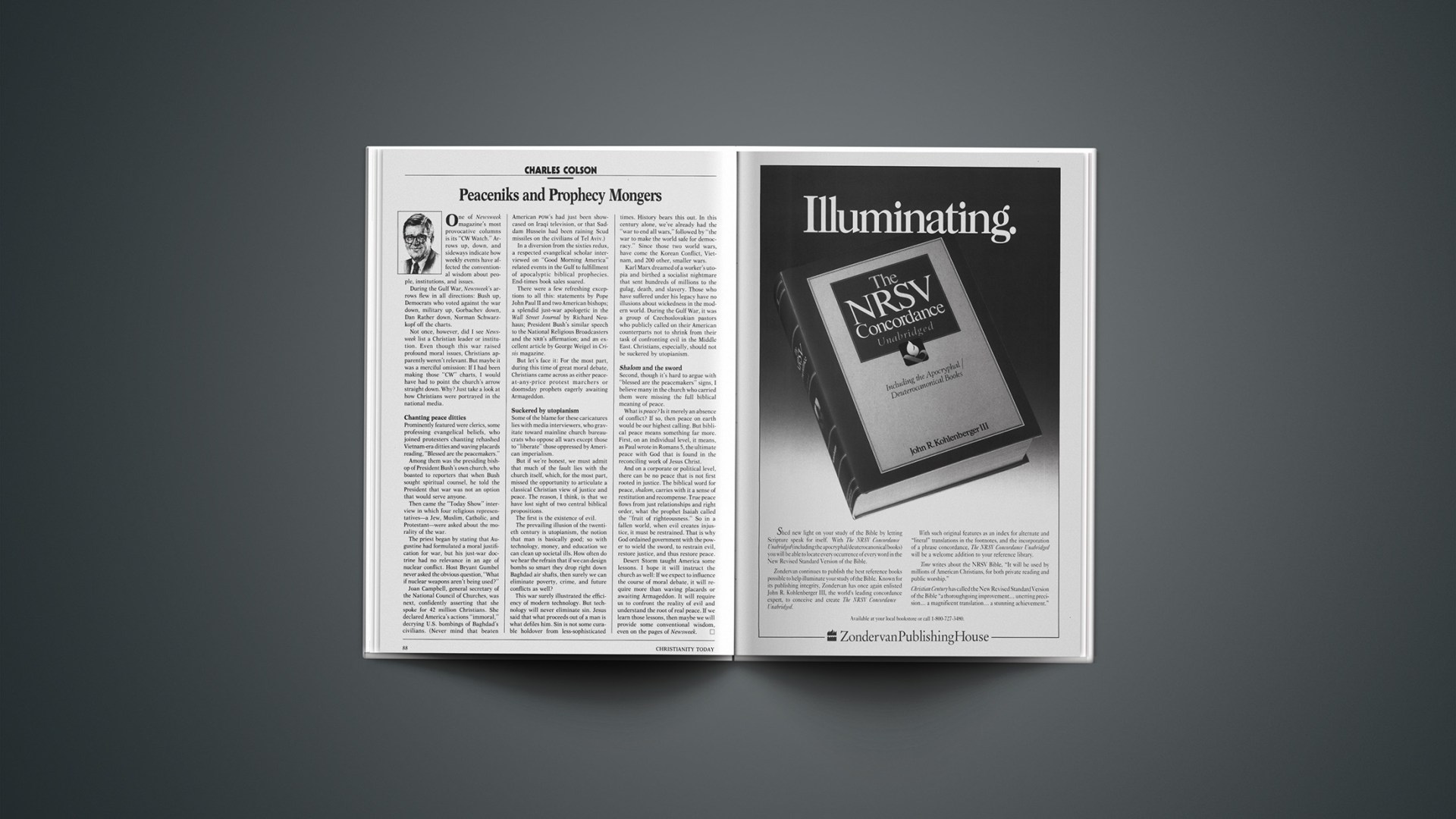One of Newsweek magazine’s most provocative columns is its “CW Watch.” Arrows up, down, and sideways indicate how weekly events have affected the conventional wisdom about people, institutions, and issues.
During the Gulf War, Newsweek’s arrows flew in all directions: Bush up, Democrats who voted against the war down, military up, Gorbachev down, Dan Rather down, Norman Schwarzkopf off the charts.
Not once, however, did I see Newsweek list a Christian leader or institution. Even though this war raised profound moral issues, Christians apparently weren’t relevant. But maybe it was a merciful omission: If I had been making those “CW” charts, I would have had to point the church’s arrow straight down. Why? Just take a look at how Christians were portrayed in the national media.
Chanting Peace Ditties
Prominently featured were clerics, some professing evangelical beliefs, who joined protesters chanting rehashed Vietnam-era ditties and waving placards reading, “Blessed are the peacemakers.”
Among them was the presiding bishop of President Bush’s own church, who boasted to reporters that when Bush sought spiritual counsel, he told the President that war was not an option that would serve anyone.
Then came the “Today Show” interview in which four religious representatives—a Jew, Muslim, Catholic, and Protestant—were asked about the morality of the war.
The priest began by stating that Augustine had formulated a moral justification for war, but his just-war doctrine had no relevance in an age of nuclear conflict. Host Bryant Gumbel never asked the obvious question, “What if nuclear weapons aren’t being used?”
Joan Campbell, general secretary of the National Council of Churches, was next, confidently asserting that she spoke for 42 million Christians. She declared America’s actions “immoral,” decrying U.S. bombings of Baghdad’s civilians. (Never mind that beaten American POW’s had just been showcased on Iraqi television, or that Saddam Hussein had been raining Scud missiles on the civilians of Tel Aviv.)
In a diversion from the sixties redux, a respected evangelical scholar interviewed on “Good Morning America” related events in the Gulf to fulfillment of apocalyptic biblical prophecies. End-times book sales soared.
There were a few refreshing exceptions to all this: statements by Pope John Paul II and two American bishops; a splendid just-war apologetic in the Wall Street Journal by Richard Neuhaus; President Bush’s similar speech to the National Religious Broadcasters and the NRB’s affirmation; and an excellent article by George Weigel in Crisis magazine.
But let’s face it: For the most part, during this time of great moral debate, Christians came across as either peace-at-any-price protest marchers or doomsday prophets eagerly awaiting Armageddon.
Suckered By Utopianism
Some of the blame for these caricatures lies with media interviewers, who gravitate toward mainline church bureaucrats who oppose all wars except those to “liberate” those oppressed by American imperialism.
But if we’re honest, we must admit that much of the fault lies with the church itself, which, for the most part, missed the opportunity to articulate a classical Christian view of justice and peace. The reason, I think, is that we have lost sight of two central biblical propositions.
The first is the existence of evil.
The prevailing illusion of the twentieth century is utopianism, the notion that man is basically good; so with technology, money, and education we can clean up societal ills. How often do we hear the refrain that if we can design bombs so smart they drop right down Baghdad air shafts, then surely we can eliminate poverty, crime, and future conflicts as well?
This war surely illustrated the efficiency of modern technology. But technology will never eliminate sin. Jesus said that what proceeds out of a man is what defiles him. Sin is not some curable holdover from less-sophisticated times. History bears this out. In this century alone, we’ve already had the “war to end all wars,” followed by “the war to make the world safe for democracy.” Since those two world wars, have come the Korean Conflict, Vietnam, and 200 other, smaller wars.
Karl Marx dreamed of a worker’s utopia and birthed a socialist nightmare that sent hundreds of millions to the gulag, death, and slavery. Those who have suffered under his legacy have no illusions about wickedness in the modern world. During the Gulf War, it was a group of Czechoslovakian pastors who publicly called on their American counterparts not to shrink from their task of confronting evil in the Middle East. Christians, especially, should not be suckered by utopianism.
Shalom And The Sword
Second, though it’s hard to argue with “blessed are the peacemakers” signs, I believe many in the church who carried them were missing the full biblical meaning of peace.
What is peace? Is it merely an absence of conflict? If so, then peace on earth would be our highest calling. But biblical peace means something far more. First, on an individual level, it means, as Paul wrote in Romans 5, the ultimate peace with God that is found in the reconciling work of Jesus Christ.
And on a corporate or political level, there can be no peace that is not first rooted in justice. The biblical word for peace, shalom, carries with it a sense of restitution and recompense. True peace flows from just relationships and right order, what the prophet Isaiah called the “fruit of righteousness.” So in a fallen world, when evil creates injustice, it must be restrained. That is why God ordained government with the power to wield the sword, to restrain evil, restore justice, and thus restore peace.
Desert Storm taught America some lessons. I hope it will instruct the church as well: If we expect to influence the course of moral debate, it will require more than waving placards or awaiting Armageddon. It will require us to confront the reality of evil and understand the root of real peace. If we learn those lessons, then maybe we will provide some conventional wisdom, even on the pages of Newsweek.










